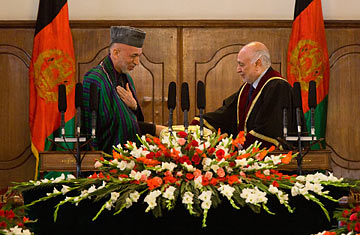
President Hamid Karzai, left, recites the oath of office during the inauguration ceremony at the presidential palace in Kabul, Afghanistan
Afghan President Hamid Karzai took his oath of office for his second term Thursday, Nov. 19, in a stately inauguration ceremony at the presidential palace in Kabul, finally putting an end to a drawn-out election drama mired in accusations of fraud and corruption. Dressed in his trademark violet- and green-striped cloak and karakul hat, Karzai placed his right hand on the Koran and swore to the attending chief of the Supreme Court that he would uphold the constitution of Afghanistan and lead the country into peace and stability. One can only hope he keeps that promise.
The ceremony, a modest affair by Afghan standards, was a celebration of traditional headgear. Tribesmen from the east sported vast swaths of butter-yellow silk looped into view-blocking turbans, while their southern cousins opted for the more somber black and gray. Northerners were identified by their flat-topped woolen pakols; the urban élites by their peaked karakul caps. They were outdone only by the portraits of Afghanistan's former rulers that lined the walls of the reception hall — some of those wore helmets. The first few rows were occupied by suited foreign dignitaries, including U.S. Secretary of State Hillary Clinton, special envoy Richard Holbrooke, the Aga Khan and Pakistani President Asif Ali Zardari, rounding out the guest list.
After swearing in his two Vice Presidents, Karzai launched into a lengthy speech promising a renewed commitment to peace and stability in Afghanistan. Sidestepping the issue of fraud that had marred the election, he instead praised the courageous Afghans who braved Taliban threats to vote and promised to strengthen democracy. By the end of his five-year term, Afghan security forces would be "capable of taking the lead in ensuring security and stability across the country," he said. Corruption and bribery, he announced, "constitute a very dangerous problem," one that he would combat through legal reform and the strengthening of anticorruption institutions in government.
Unusually for Karzai, who has in the past burst into tears or exploded with finger-pointing rage during public addresses, the speech was hurried and voiced in a near monotone. He paused only to gently chastise — in English — the late arrival of a dignitary from the United Arab Emirates who then slunk to his chair in shame. Few in the audience were surprised by his pronouncements. They were, said Sima Samar, head of Afghanistan's human-rights commission, to be expected. "But a speech is not enough. We need action," Samar said. "We need to see if his promised reforms are implemented on the ground."
That is most likely to be the U.S. government's response as well. As part of her unannounced (but hardly secret) visit, Clinton had dinner and a long conversation with Karzai the night before the ceremony and was expected to have delivered strong words. En route to Kabul, she told reporters traveling with her that Karzai's government had started to tackle corruption, "but not nearly enough." Part of that reservation may have had something to do with Karzai's two Vice Presidents also being sworn in, Mohammad Qasim Fahim and Karim Khalili. Both have been accused by Afghan civil-society groups of egregious human-rights abuses, and one has been closely linked to Afghanistan's multibillion-dollar drug trade. In the audience was Karzai's close supporter, former warlord General Abdul Rashid Dostum, who has been accused of massacring thousands of Taliban prisoners in 2001, soon after the U.S.'s arrival. Even if Karzai is committed to cracking down on corruption and strengthening the rule of law, he will have a hard time sidelining the allies who helped him get re-elected. Still, Clinton was optimistic. In a press conference later that day, she praised Karzai's inaugural address, saying it "provides an important new starting point, and we intend to build on it."
The vast hall emptied within moments of Karzai's last words. A few guests lingered outside in the crisp air but were eventually pushed aside by workmen rolling up the layers of red Afghan rugs that had been laid over the concrete walkways for the occasion. Ali Seraj, great-grandson of former King Abdul Rahman Khan, Afghanistan's first modern monarch, took a nostalgia-tinged stroll through the nearby rose garden. His great-grandfather had built the turn-of-the-century palace, and Seraj took particular pride in pointing out the beautiful buildings his ancestors had once inhabited. The inauguration hall was where the king once received supplicants; a crumbling ruin had once housed his great-grandfather's elephants. As he paused to point out the crenellated entrance gate, a bent old man approached — the palace gardener. Clasping his wizened hands around Seraj's, he described how he once had the honor of tying the royal sash around the waist of Seraj's uncle, the then King Amanullah Khan. Seraj beamed, grateful to be recognized as royalty. When Seraj was asked his thoughts on attending the swearing-in of a President at a palace that once housed his family, his face darkened slightly. "We hope he brings honor to this place," he said. "Like our forefathers did."
